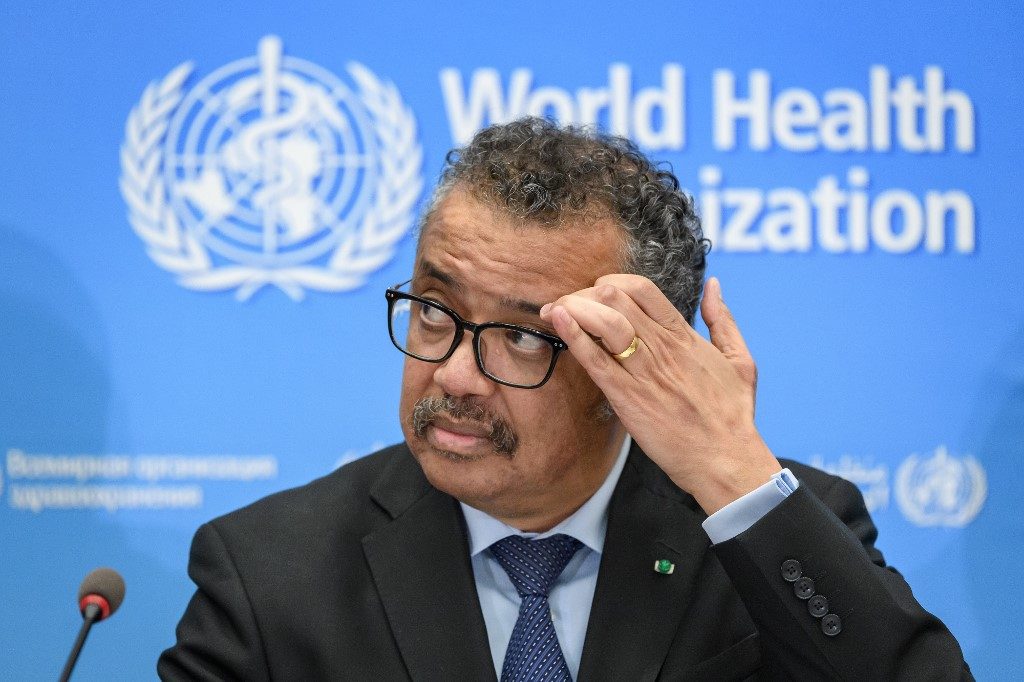SUMMARY
This is AI generated summarization, which may have errors. For context, always refer to the full article.

GENEVA, Switzerland (UPDATED) – The World Health Organization on Friday, February 28, raised its global risk assessment of the new coronavirus to its highest level after the epidemic spread to sub-Saharan Africa and financial markets slumped.
The virus has proliferated around the globe over the past week, emerging on every continent except Antarctica, prompting many governments and businesses to try to stop people from travelling or gathering in crowded places.
It has killed more than 2,800 people and infected over 84,000 worldwide – the vast majority in China – since it emerged apparently from an animal market in the central Chinese city of Wuhan in late December.
But it is its rapid spread to new zones that has authorities concerned – in the past 24 hours, it has affected 9 new countries, from Azerbaijan to Mexico to New Zealand. (READ: WHO: 9 countries, including PH, show coronavirus ‘can be contained’)
“We have now increased our assessment of the risk of spread and the risk of impact of COVID-19 to very high at global level,” WHO chief Tedros Adhanom Ghebreyesus told reporters.
“We do not see evidence as yet that the virus is spreading freely in communities. As long as that’s the case, we still have a chance of containing this virus.”
Global investors nevertheless ran scared, with world markets suffering their worst week since the 2008 financial crisis.
The chair of the US Federal Reserve, Jerome Powell, said the central bank stood at the ready to intervene if needed, given the “evolving” risks to the world’s largest economy posed by the deadly outbreak.
New drastic measures were put in place: Switzerland cancelled all gatherings of more than 1,000 people, and Saudi Arabia banned Gulf citizens from its holy cities of Mecca and Medina.
“This is not a time for panic. It is time to be prepared — fully prepared,” UN Secretary-General Antonio Guterres said.
‘Struggling with containment’
Those efforts come as the number of deaths and new infections has been tapering off in China, following unprecedented quarantine efforts locking down tens of millions of people in the worst-hit cities.
But infections elsewhere have started to surge, with Iran, Italy and South Korea becoming the major new hotspots and cases being confirmed in around 50 countries.
“We see a number of countries struggling with containment,” said Michael Ryan, head of the WHO’s health emergencies programme.
The WHO has voiced particular concern about Africa’s preparedness, warning that the continent’s health care systems were ill-equipped to respond to a COVID-19 epidemic.
Cases had previously been reported in Egypt and Algeria, but not in the sub-Saharan region until Friday when Nigeria reported its first case: an Italian man in densely populated Lagos.
In Iran, unnamed health system sources told the BBC that at least 210 people had died of the coronavirus — far beyond the official death toll of 34, but a health ministry spokesman angrily denied that figure.
Schools closed, events cancelled
The coronavirus crisis is affecting everything from global production to schools to sporting events, with FIFA warning Friday that international football matches could be postponed.
Several companies have said they expect the virus to hit their earnings because of weaker demand.
Oil prices also slipped again, with Brent oil for April delivery sinking as low as $50.05 a barrel.
Analysts have warned that China, the world’s second-largest economy, will see a major cut in growth this quarter as the country remains largely paralysed by quarantines and containment measures.
China hope
Still, signs in China offered hope that the outbreak could be contained.
China reported 44 more deaths on Friday, raising its toll to 2,788, with 327 new cases — the lowest daily figure for new infections in more than a month.
The virus has mostly killed the elderly or people with pre-existing health conditions.
South Korea also now has the most cases outside China, with more than 2,000 infections and 13 deaths.
The virus has had wide-ranging impact, even forcing K-pop megastars BTS to cancel four Seoul concerts scheduled for April.
British cruise ship passenger dies
In Japan, the health ministry said a British man who was on board a coronavirus-stricken cruise ship quarantined near Tokyo had died. More than 700 others on the ship have tested positive.
The governor of Japan’s rural northern island of Hokkaido urged people to stay at home this weekend in a desperate effort to contain the outbreak.
In Europe, the largest epicenter is Italy with 650 cases and 17 deaths – mostly in cities in the north.
Wide-ranging measures to halt the spread of the virus have affected tens of millions of people in northern Italy, with schools closed and cultural and sporting events cancelled.
Experts said the virus had probably “circulated unnoticed for several weeks” before the first confirmed cases — possibly since January. – Rappler.com
Add a comment
How does this make you feel?
There are no comments yet. Add your comment to start the conversation.